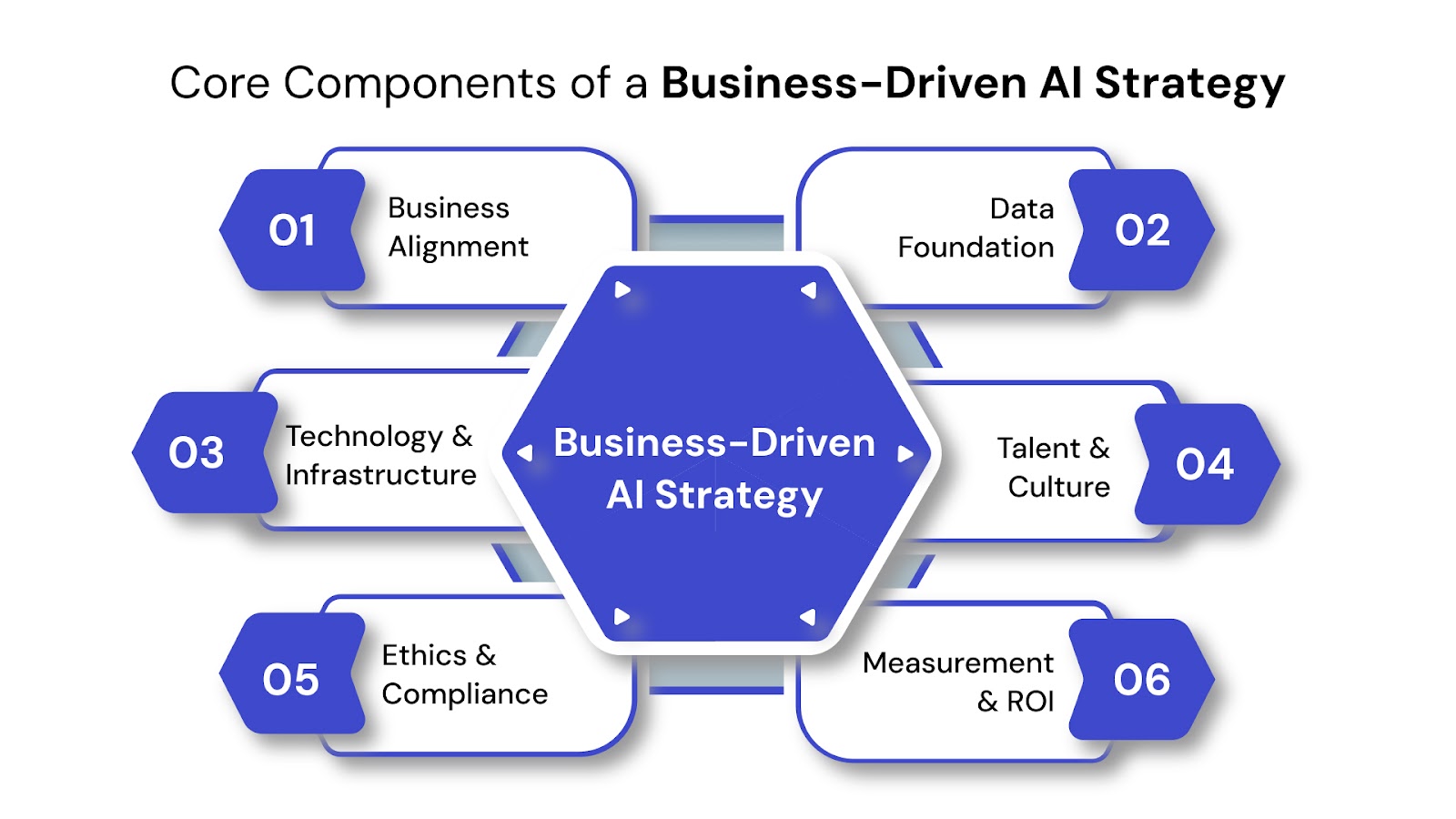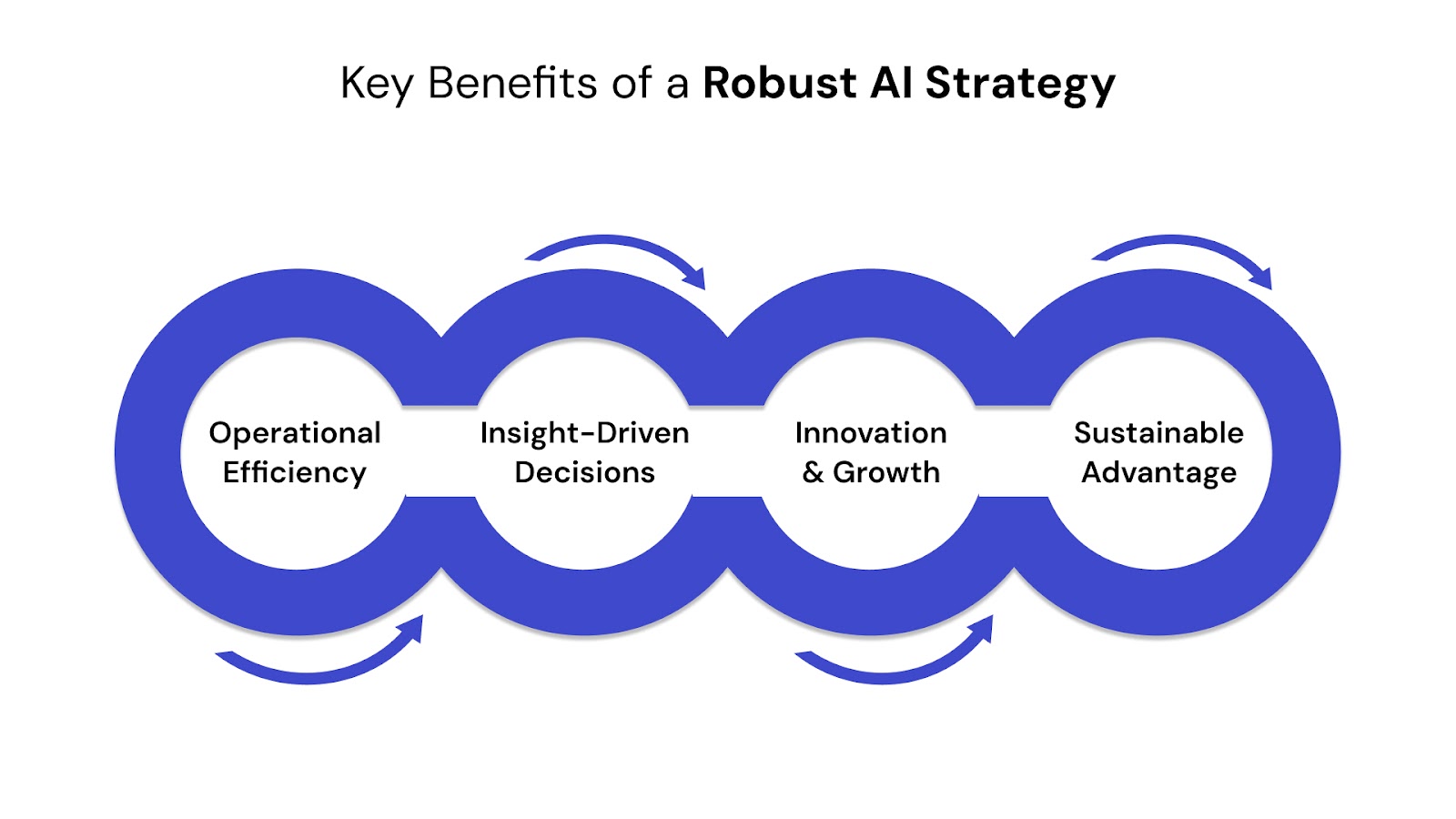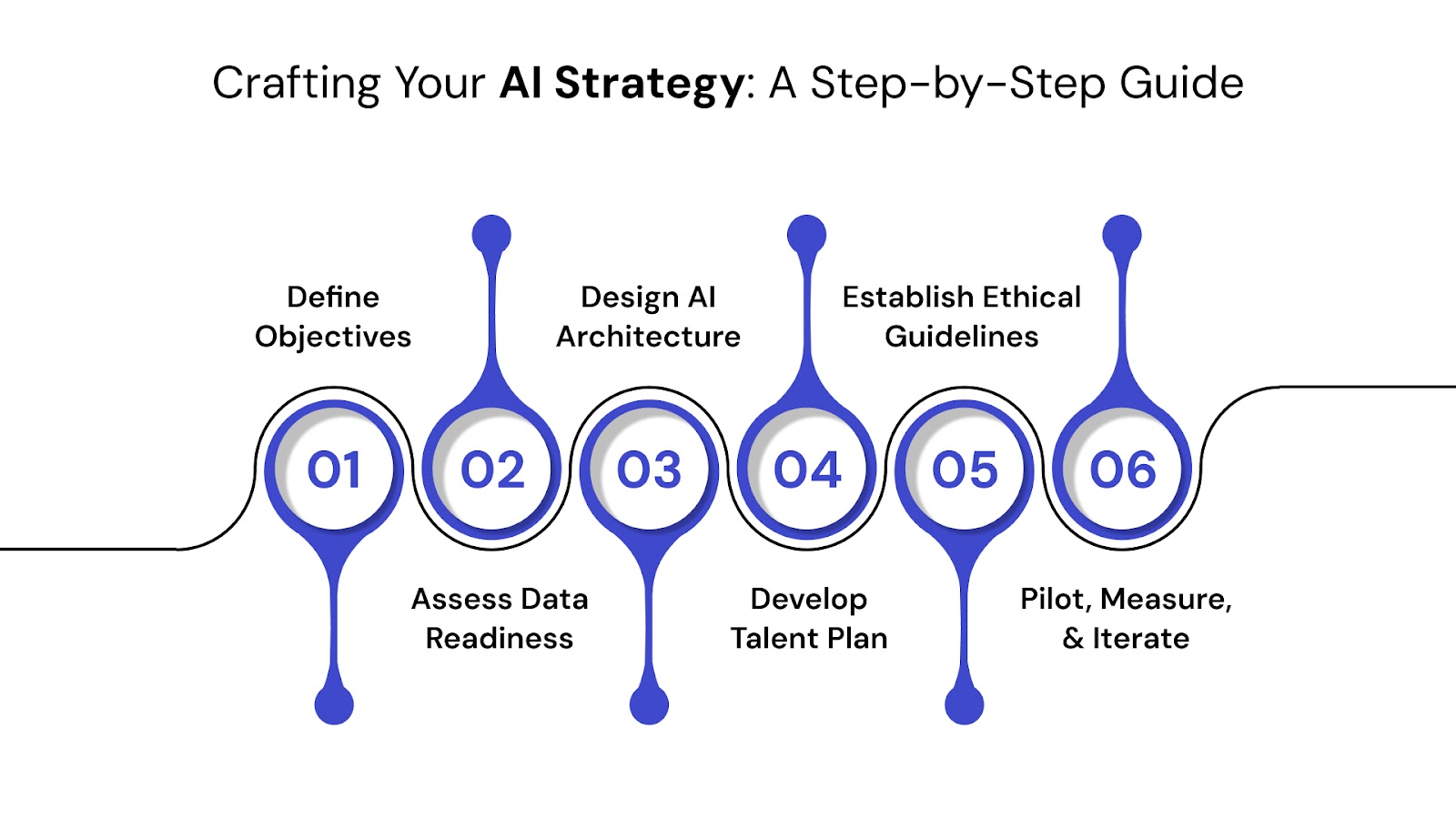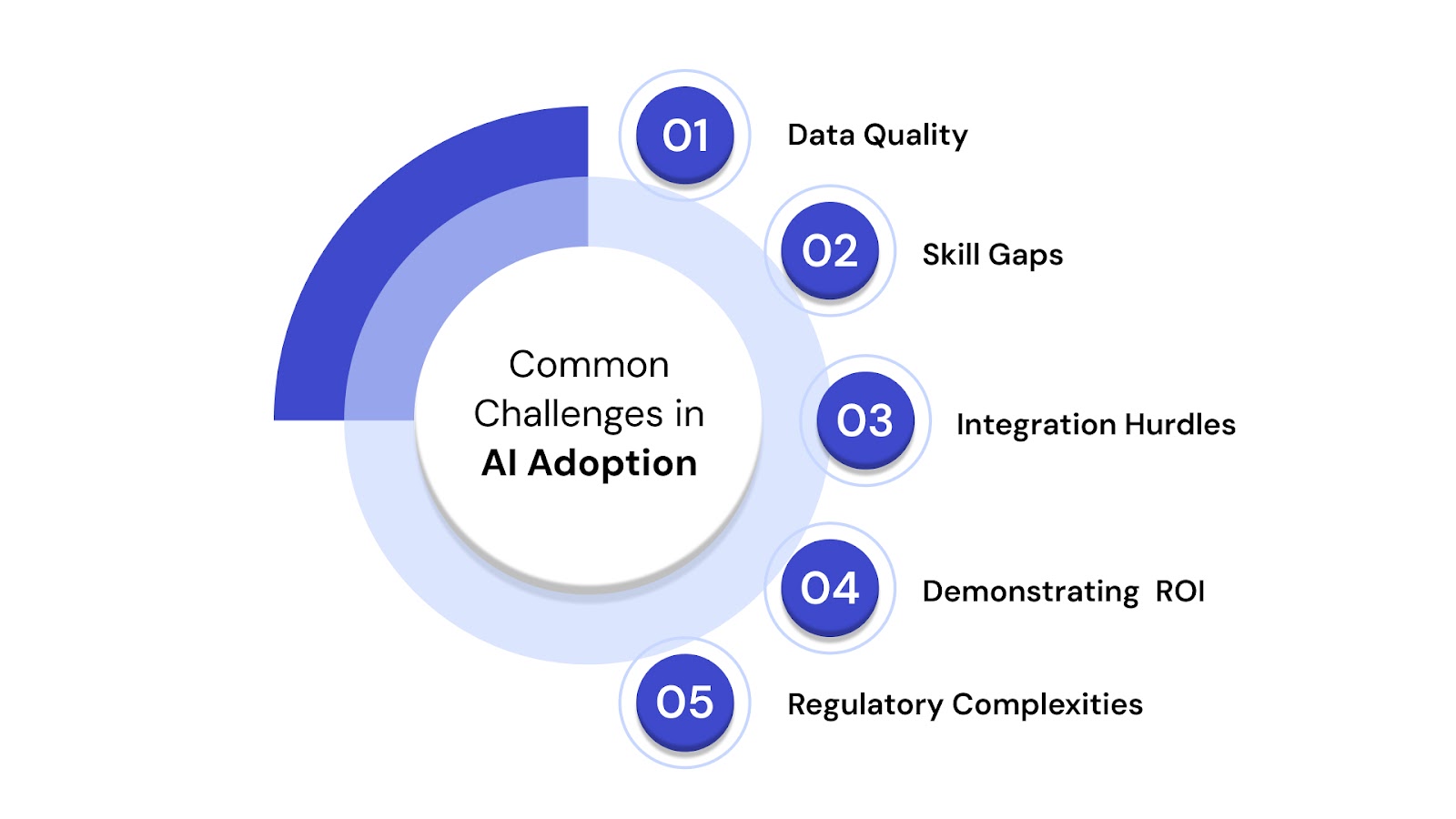

As enterprises increasingly invest in Artificial Intelligence (AI), a crucial question emerges: how can it truly unlock transformative value, moving beyond pilot projects to sustained, scalable impact? Many organizations invest heavily in AI tools, yet often fall short of realizing their full potential without a robust, well-defined AI strategy.
In fact, according to recent BCG research, only 26% of companies successfully move beyond proofs of concept to generate tangible value from AI. This guide provides the strategic insights and technical depth needed to bridge that gap.
We'll explore how to build an AI strategy that aligns with your core business objectives, offering a clear, actionable roadmap for deployment and long-term success. Our aim is to empower you to integrate AI effectively, driving innovation and achieving measurable outcomes.
An enterprise AI strategy is a meticulously crafted plan that outlines how an organization integrates Artificial Intelligence to achieve specific, measurable business outcomes and sustain a competitive advantage. It transcends mere technology adoption; it is a strategic imperative that embeds AI capabilities across your operations to drive tangible, measurable value.
This comprehensive framework ensures AI initiatives solve real-world problems, enhance operational efficiency, foster innovation in products or services, and secure a distinct market position.

Developing a robust AI strategy requires orchestrating several critical components. Each element is crucial for ensuring that AI initiatives deliver tangible, measurable business value and are sustainable in the long run.
For organizations using advanced intelligent automation, understanding the underlying Architecture and Components of Gen AI Agents is crucial for building scalable and efficient systems.

Beyond an investment in technology, implementing a well-defined AI strategy helps transform your business for sustained growth and resilience. For leaders grappling with rising operational costs, fragmented data, or the need to accelerate innovation, a strategic approach to AI offers clear pathways to overcome these challenges and unlock significant competitive advantages.
One of the most immediate impacts of a well-executed AI strategy is its ability to streamline operations, automate repetitive tasks, and drastically reduce human error. This leads to substantial cost savings and allows your most valuable talent to focus on higher-value, strategic initiatives.
Companies in the telecommunications and healthcare industries have found that AI forecasting engines can automate up to 50% of workforce-management tasks, leading to cost reductions of 10-15% and improved operational resilience.
An AI strategy empowers your organization to make informed, data-driven decisions swiftly by integrating disparate data sources and deploying predictive analytics. It moves businesses from reactive responses to proactive foresight, delivering real-time, actionable intelligence.
For instance, Mastercard is enhancing its card fraud detection with Generative AI, which doubles the detection rate of compromised cards, reduces false positives by up to 200%, and increases the speed of identifying at-risk merchants by 300%. This rapid and accurate identification allows for faster blocking and reissuance, significantly mitigating potential losses and enhancing cybersecurity.
An AI strategy acts as a powerful catalyst for innovation, directly addressing challenges like stagnant product lines and slow adaptation to market demands. It enables businesses to develop new products, personalize customer experiences, and identify untapped market opportunities, transforming customer engagement and offerings.
Retail giants like Amazon have famously utilized AI for personalized recommendations. These tailored suggestions significantly increase sales and customer loyalty; Amazon itself attributes nearly 35% of its sales to its personalization efforts.
Ultimately, a well-orchestrated AI strategy transforms how your organization competes, directly addressing the struggle to differentiate or adapt quickly to market shifts. It builds a durable competitive moat, allowing for greater agility, responsiveness, and a future-proofed business model.
Microsoft Azure's strategic investments in AI, particularly its deep integration with OpenAI, have significantly bolstered its competitive position in the cloud market. By offering cutting-edge generative AI capabilities and robust AI infrastructure services, Azure attracts and retains enterprise customers, differentiating itself from rivals and cementing its status as a leading AI platform.

Developing a successful enterprise AI strategy requires a structured, iterative approach. It's not a one-time project but a continuous journey of alignment, execution, and refinement. Following a clear roadmap ensures your AI initiatives deliver measurable business value and drive sustainable growth.
Every successful AI strategy begins with a clear understanding of your business goals. Before exploring technology, define the specific challenges AI will solve or the new value it will create for your organization.
High-quality, accessible data is the fuel for effective AI models. A thorough assessment of your current data landscape and robust governance are non-negotiable for building a reliable AI strategy.
For a deeper understanding of establishing this crucial data foundation, explore our guide on Steps and Essentials to Prepare Data for AI.
Transforming business needs into a functional AI environment requires careful architectural planning and technology stack selection. Focus on building a scalable, integrated, and future-proof foundation.
An AI-ready workforce and a supportive organizational culture unlock the true power of AI. Investing in your people is as crucial as investing in technology for sustainable AI adoption.
As AI becomes more pervasive, establishing clear ethical guidelines and robust risk mitigation strategies is non-negotiable. This protects your brand reputation and ensures long-term operational viability.
The final step involves a strategic, iterative approach to deployment, focusing on proving value and continuous improvement. Start small, learn fast, and scale effectively.

While Artificial Intelligence offers immense transformative potential, its successful adoption often comes with a set of common hurdles. With a well-thought-out AI strategy framework and a proactive approach, organizations can effectively overcome these obstacles and unlock the full value of their AI investments.
AI models are only as good as the data they consume. Enterprises frequently struggle with fragmented, inconsistent, or poor-quality data, making it difficult to train effective AI models and derive reliable insights. This leads to unreliable predictions and failed initiatives.
Solution: Prioritize building a robust data foundation with clear governance. This involves investing in data quality initiatives, integrating disparate data sources into unified platforms, and establishing strict protocols for data ownership, access, and compliance.
For a comprehensive guide on unifying your data landscape, read the blog on Exploring Tools and Solutions for Modern Data Integration.
A scarcity of specialized AI talent and natural resistance to adopting new technologies within the organization can significantly slow down AI initiatives and limit their enterprise-wide impact. Employees may also fear job displacement or the need for extensive retraining.
Solution: Invest in developing an AI-literate workforce and foster a culture that embraces change. Implement targeted training and reskilling programs, encourage cross-functional collaboration, and ensure strong, transparent leadership communication about AI's benefits and its role in augmenting human capabilities.
Integrating new AI solutions with complex legacy systems and scaling successful pilot projects to full enterprise deployment are common technical and operational roadblocks. This often traps AI initiatives in "pilot purgatory," preventing them from delivering widespread value.
Solution: Design for seamless integration and scalability from the outset. Adopt modular architectures, use cloud-native AI services for flexibility, and implement MLOps practices to automate the deployment, monitoring, and management of AI models in production environments.
Many AI projects fail to secure continued investment because they struggle to demonstrate a clear, measurable return on investment (ROI) or are not directly aligned with core business objectives. This can lead to projects being abandoned or failing to gain traction.
Solution: Ground every AI initiative in a clear business case with predefined metrics. Start with high-impact business problems, establish clear Key Performance Indicators (KPIs) upfront, and continuously measure and communicate the tangible value AI delivers to the organization, ensuring alignment with your overall AI strategies.
Concerns around algorithmic bias, data privacy, transparency, and the rapidly evolving regulatory landscape pose significant risks. Ignoring these issues can lead to unfair outcomes, data breaches, reputational damage, and non-compliance with new laws.
Solution: Prioritize responsible AI deployment and robust governance. Develop clear ethical guidelines, implement privacy-by-design principles, actively monitor AI models for bias, and stay abreast of evolving regulatory landscapes to refine your generative AI strategy and ensure legal and ethical adherence.
Artificial Intelligence is no longer an optional add-on; it is a fundamental strategic imperative for businesses aiming to remain competitive and drive growth. The journey to successful AI adoption, while fraught with challenges, offers unparalleled opportunities for innovation, efficiency, and differentiation.
Success hinges on a well-defined AI strategy framework that not only identifies high-value opportunities but also proactively addresses potential hurdles related to data, talent, technology, and ethics.
How QuartileX Elevates Your AI Strategy
Achieving strategic integration and overcoming inherent complexities often demands specialized expertise. This is where QuartileX steps in, offering end-to-end AI/ML development services tailored to your unique business needs, helping you transform potential into performance.
Ready to embark on your intelligent transformation? Partner with QuartileX to build an AI strategy that drives measurable results and positions your business for future success.
An AI strategy is a comprehensive blueprint that outlines how an organization plans to integrate, develop, and scale Artificial Intelligence to achieve specific business objectives. It's a structured approach to utilizing AI to create value, enhance operations, and align with broader organizational goals.
An AI strategy enables businesses to automate tasks, improve decision-making, enhance customer experiences, boost sales, and reduce risks. Without a clear strategy, companies risk falling behind competitors who are effectively harnessing AI for efficiency, innovation, and growth.
Developing an enterprise AI strategy can take anywhere from a few weeks for the foundational assessment and strategic roadmap (e.g., 1-3 months) to several months for detailed planning and pilot project initiation. Full implementation and widespread adoption across the enterprise is an ongoing journey that can span years, involving continuous iteration, scaling, and cultural adaptation.
Generative AI is a powerful subset of AI that can create new content (text, images, code). Within an AI strategy, it's used to augment worker productivity (e.g., drafting content, summarizing information), enhance product development, improve customer experience (e.g., advanced chatbots), and optimize processes.
Measuring AI success involves demonstrating tangible business impact. Key performance indicators (KPIs) should be defined upfront and can include operational efficiency gains (e.g., reduced process times, lower error rates), financial impact (e.g., ROI, cost savings, revenue growth), and customer satisfaction improvements (e.g., faster response times, higher CSAT scores). Continuous monitoring and alignment with business objectives are crucial.
From cloud to AI — we’ll help build the right roadmap.
Kickstart your journey with intelligent data, AI-driven strategies!